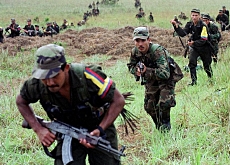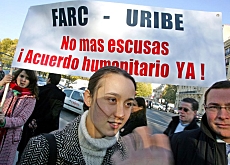Colombia accuses Swiss of funding rebels

The Colombian government has slammed Switzerland for allegedly supporting the main leftwing rebel group, Revolutionary Armed Forces of Colombia (Farc).
The foreign ministry refused to comment, while a non-governmental group rejected the accusations as unfounded.
Vice-president Francisco Santos told a news conference in Bogotá on Friday that the Swiss foreign ministry’s Agency for Development for Cooperation (SDC) funded an aggressive campaign against the Colombian authorities.
Officials added the two Swiss church charities, Lenten Fund and Bread for All, had been running an anti-Colombian poster campaign ahead of Easter. They also criticised a door-to-door fundraising effort in Geneva.
Colombia’s ambassador to Switzerland, Elena Echavarria, earlier this month told the Genveva-based Le Temps newspaper that she was concerned about alleged activities by the Farc rebels in Switzerland.
The accusations come ahead of the May 28 vote in Colombia, in which President Alvaro Uribe – popular for cutting crime as part of his United States-backed crackdown on the rebels – is expected to win re-election.
The Colombian government and the 17,000 strong leftwing rebels, which are known to fund themselves through drugs smuggling, have been fighting each other for four decades.
Human rights
Antonio Hautle, director of the Lenten Fund, has rejected the accusations of helping the rebels.
“It was never our intention to target the Colombian government. In our Easter campaign we drew attention to human rights violations across the world, including Colombia,” he told swissinfo.
Hautle also said that the church charities had criticised a unilateral amnesty to members of Colombia’s rightwing militias.
The Lenten Fund says it is supporting several human rights groups in Colombia.
“The government is responsible for ensuring that human rights are observed. Often civilians are taken hostage in the conflict between the government, the militias and the rebels,” Charles Sidoré said.
A Swiss foreign ministry spokeswoman refused to comment on the accusations.
Earlier this month the Colombian government invited Foreign Minister Micheline Calmy-Rey for a visit to Bogotá.
Switzerland, Spain and France have been involved in efforts to negotiate a humanitarian agreement between the Colombian government and the Farc rebels, aimed at winning the release of several hundred rebels and 59 civilian hostages, including Ingrid Betancourt, a candidate in the 2002 presidential election.
swissinfo
The Lenten Fund was set up by Switzerland’s Catholic church in 1961, and supports about 230 aid projects in 23 countries every year.
In 2004 it invested a total of SFr16 million ($12.5 million) in parishes or in development aid projects overseas and in Switzerland.
Bread for All is a charity of Switzerland’s Protestant churches and runs development aid projects in Africa, Asia and Latin America since 1961.
In 2004 it spent SFr11.8 million on development aid.
Last December, Spain, France and Switzerland proposed setting up a demilitarised zone of 280km2 surface to facilitate negotiations for humanitarian accord between the Colombian government and leftwing rebels.
The 17,000-strong Revolutionary Armed Forces of Colombia rebels (Farc) have rejected the proposals.
The smaller leftwing National Liberation Army (ELN) in December held exploratory talks with the Colombian government, mediated by Switzerland.

In compliance with the JTI standards
More: SWI swissinfo.ch certified by the Journalism Trust Initiative

You can find an overview of ongoing debates with our journalists here. Please join us!
If you want to start a conversation about a topic raised in this article or want to report factual errors, email us at english@swissinfo.ch.